Senate passes limit on access to police body cam videos

The Minnesota Senate has passed a measure that would restrict who can see videos recorded by police body cameras.
After the Senate added the provision to a bill that regulates how police collect and retain information from automated license plate readers, on Thursday it passed 41 to 19, setting up a debate over whether the public should have access to video from the cameras.
But the Senate action is no guarantee the debate will be settled this legislative session.
The Legislature has been stymied over how to handle the video gathered by police body cameras. On one hand, allowing the video to be public could help prevent police misconduct. But allowing access to the video could also violate the privacy of victims and others in vulnerable situations.
Create a More Connected Minnesota
MPR News is your trusted resource for the news you need. With your support, MPR News brings accessible, courageous journalism and authentic conversation to everyone - free of paywalls and barriers. Your gift makes a difference.
State Sen. Ron Latz, DFL-St. Louis Park, added the body camera language to the license plate reader bill. He said current law allows anyone to have access to the video.
"It could be posted on YouTube," said Latz. "And who has access to this Internet-posted data? Friends, neighbors, potential employers, current employers, voyeurs."
Latz's bill would allow access to the video only if the subject in the recording requests it, if the video captures the use of force causing bodily harm or if the video is taken in a public place.
Citing the highly controversial police shooting in Ferguson, Mo., Latz said body cameras could provide greater accountability.
"If that officer had been wearing a body camera, maybe exoneration would have come sooner, would have resolved the conflicting eyewitness statements and might have avoided riots," he said. "The cameras are really there to protect everyone in a situation."
State Sen. Branden Petersen, R-Andover, said he's disappointed the body camera language was attached to the license plate bill instead of being debated on its own merits.
Peterson said he finds it ironic that a bill that principally aims to ensure "public accountability or government accountability is being offered up in this manner."
He and other civil liberties advocates also were critical of the size and scope of the license plate surveillance technology being used by police departments. The bill would allow police to scan and store license plate data for up to 90 days.
State Sen. Roger Chamberlain, R-Lino Lakes, said allowing police to keep innocent people's information crosses a line into invasion of privacy.
"They're going to collect data and keep it on you," Chamberlain said. "And if anybody who sits in this room believes that that's not going to be compromised or used in some bad way just because you put some fancy words on a piece of paper and you file it in some statute, you clearly don't understand human nature and what we're subjected to under the powers of government."
The Senate bill now has to be reconciled with a different bill in the Minnesota House that allows police to keep license plate data for 30 days. The House bill doesn't say anything about police body cameras.
State Rep. Tony Cornish, who sponsored the House bill, said the Senate should not push to include body cameras in a final version because it could kill the entire bill for the session.
"If they really want to want to get something and pass a license plate reader bill they won't screw around," said Cornish, R-Vernon. "They'll just take it up on its own merits and pass it like we want. If it all goes down in flames, there's always next year."
Lawmakers have little time to negotiate their differences. The constitutional deadline to adjourn is May 18.